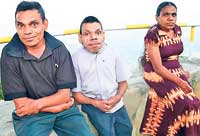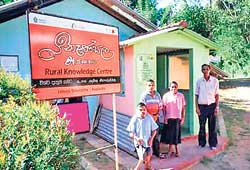
Sri Kanth walks tall in the IT worldIf you think people with disabilities never get ahead in life, think again! Some of Sri Lanka's leaders in fast-track industries, including Information & Communications Technology (ICT), come under this category. On August 1, this year in New Delhi, 25 ICT champions representing countries including Sri Lanka were honoured as Fellows of the Jamshetji Tata National Virtual Academy (NVA), along with 600 Indian grassroots leaders, by Prof. M.S. Swaminathan and Prof. Rajshekharan Pillai, the Vice Chancellor of the Indira Gandhi National Open University. According to one Indian newspaper report, “One of the Fellows, a Nanasala operator from Sri Lanka, informed that his telecentre is accepting Business Process Outsourcing (BPO) work from Delhi, India and their client is satisfied with their output!” The Fellow was Selvaratnam Sri Kanthan of Koslanda, or Sri Kanth as the diminutive rural ICT champion is best known among Sri Lanka's 454 ICTA-sponsored Nanasalas, or Rural Knowledge Centres.
Sri Kanth was born in 1973 to Saraswati (a native of Tiruchy) and Selvaratnam, a school principal and native of Koslanda. Sri Kanth, his younger brother Chandra Kanth, and their older sister Prema were born with the same congenital condition (dwarfism) – they are unusually short and suffer from debilitating bone conditions that hinder normal mobility and dexterity. Their condition made it difficult to attend school with other children, or to engage in normal activities. Chandra Kanth is affected to an extent that severely limits his mobility and dexterity. Sri Kanth alone works and travels to support his family since their father’s retirement. At the age of 16, Sri Kanth moved to Colombo where he worked for ten years as a sales clerk, cashier and storekeeper. In 2000 he started his own offset printing press in Koslanda. Working as a team, the family including father, mother and three siblings, managed to earn a modest living. In 2005 they learned that the Information & Communications Technology Agency (ICTA) had launched an initiative to create Nanasalas or ICT-based Rural Knowledge Centres in economically backward areas. The family applied and in April 2005 their Nanasala (www.nanasala.org) opened its doors to Koslanda villagers, most of whom had never before seen a computer. Since then, Koslanda Nanasala has introduced hundreds of villagers to Information Technology, and is today recognized as one of Sri Lanka’s best in terms of innovation and range of services to nearby communities. The Koslanda Nanasala’s success is due to teamwork between Sri Kanth, brother Chandra Kanth who is an expert at hardware and network administration, and sister Prema, who manages the Nanasala. Their shared disability drives them to be innovative and hard working. Through ICT, social networking and constant learning, they are discovering—and sharing—novel ways of problem solving.
His family’s experience with disabilities—and their success after a long struggle to overcome social stereotypes and economic handicaps—led him and his family to want to help other families suffering from poverty and disabilities, starting with those in the hill country, where poverty and isolation are especially severe among families of the handicapped. The Selvaratnam family, through a network of Nanasalas in Badulla District and with help from the Sri Lanka Children's Trust, created the Hill Country Disability Group. Without even waiting for funds, they launched their own newsletter and website (www.hcdg.org). By rallying support for their cause and implementing novel pilot projects, they have earned praise from families, government officials and sponsors alike. From the start, their philosophy has been not to stigmatize the handicapped further by merely targeting them for charity, but rather to seek imaginative solutions whereby persons with disabilities can become economically self-sufficient. Improved health, sanitation and education all play important roles. But emphasis is upon empowering the disabled to become economically self-reliant. Notably, the Selvaratnam family has engaged other Nanasala operators in Badulla district. The Nanasala operators meet quarterly, and are in almost daily contact via phone and broadband Internet. Through their ICT-enabled network, the Nanasala operators are helping families living with disabilities to apply for monthly support stipends issued by the National Secretariat for Persons with Disabilities, with forms in Sinhala and Tamil available on the Group's website. Despite his handicap, Sri Kanth, always talkative, sociable, speaks three languages, travels ceaselessly and is a common sight in villages and towns in Badulla District, where he initiated and leads the Uva Province Telecentre Family (www.tcf.lk). Lately he has accepted repeated invitations to lecture to young Nanasala operators in Colombo and on the east coast as well.
Sri Kanth is also a coordinator of the Telegenetics Project, a joint undertaking of the ICTA, Koslanda Nanasala, Kurunegala Base Hospital and the Human Genetics Unit of the Faculty of Medicine, University of Colombo, that uses ICT to facilitate remote diagnosis of genetic disorders among families in remote areas. Of special interest to the Nanasala community has been Sri Kanth's work in the field of BPO or Business Process Outsourcing. As BPO partner with NLingua Services of New Delhi, a voice transcription and translation service, his Nanasala employs Koslanda residents to translate and transcribe audio files from Tamil or Sinhala into English, or vice versa. Sri Kanth recently launched BeePeeO Data Solutions Pvt. Ltd. (www.BeePeeO.com) that outsources work among Nanasalas, serving corporate customers in Sri Lanka and abroad. He was feted at the ICTA-sponsored 10th Private Sector Forum in Colombo on November 20 where the acting Chairman of the ICTA singled out Sri Kanth as a pioneer in promoting BPO as a 'win-win' proposition. Next week the Third Global Knowledge Conference, a unique gathering of 2,000 global visionaries, innovators, practitioners and policy makers, takes place in Kuala Lumpur. “I will also be there,” says Sri Kanth, proudly but modestly. In fact, he leads the small delegation of rural Nanasala operators who have managed, despite all odds, to find a way to attend it.
Says Sri Kanth, always the optimist, “The best is yet to come!” |
|| Front
Page | News | Editorial | Columns | Sports | Plus | Financial
Times | International | Mirror | TV
Times | Funday
Times || |
| |
Reproduction of articles permitted when used without any alterations to contents and the source. |
© Copyright
2007 | Wijeya
Newspapers Ltd.Colombo. Sri Lanka. All Rights Reserved. |


